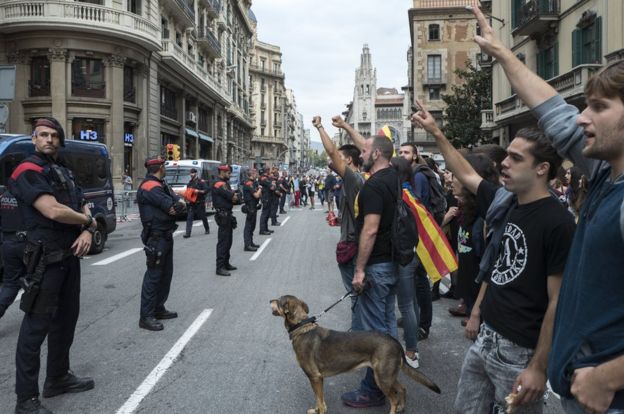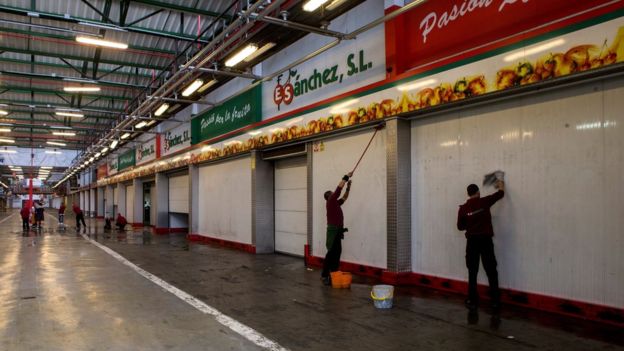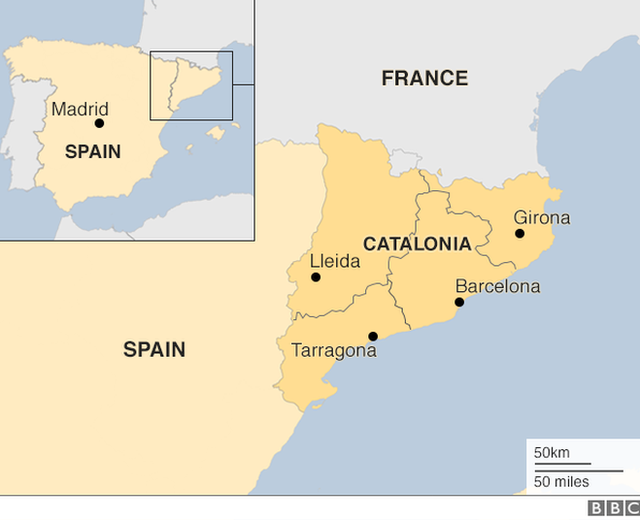
This article is more than
8 year oldCatalan President Carles Puigdemont told the BBC he would declare independence "at the end of this week or the beginning of next".
The European Union said it was "time to talk" to find a solution to the crisis in Catalonia.
Commission Vice-President Frans Timmermans said the Spanish constitution must be followed.
Mr Timmermans, addressing the European Parliament, described the images of violence from Catalonia as "saddening", but emphasised the importance of upholding the rule of law.
In his intervention, late on Tuesday, King Felipe branded Sunday's referendum in the north-eastern Spanish region illegal and undemocratic.
But correspondents say his failure to acknowledge the violent repression of the vote has fired up rather than deterred independence supporters.
Meanwhile, Spain's high court has summoned the head of Catalonia's regional police force to testify as a suspect in a investigation of alleged sedition - inciting rebellion against the state.
Josep Lluís Trapero and three other people are expected to appear in court on Friday in a move likely to inflame sentiment further amid Spain's deepest political crisis in decades, say correspondents.
Following the BBC interview in which he said there would be a declaration of independence in the coming days, Carles Puigdemont said he would make a statement at 21:00 (19:00 GMT) on Wednesday.
Groups in the Catalan parliament have agreed that parliament should meet in full assembly on Monday. Mr Puigdemont could also use that occasion to make a unilateral declaration of independence.
When asked what he would do if the Spanish government were to intervene and take control of Catalonia's government, Mr Puigdemont said it would be "an error which changes everything".
Under Article 155 of the Spanish constitution, the government in Madrid is permitted to impose direct rule on autonomous regions.
Mr Puigdemont says not, and Spanish President Mariano Rajoy has kept silent since the scenes of police violence which accompanied Sunday's vote.
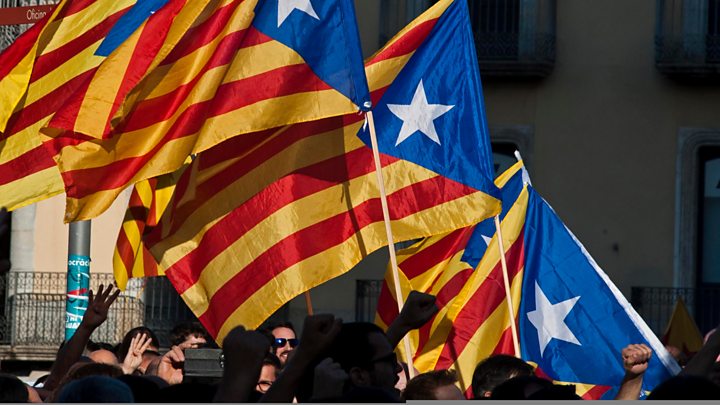
The Spanish government has vowed to resist any declaration of independence, with Mr Rajoy previously saying the vote made a "mockery" of democracy.
Barcelona Mayor Ada Colau has called on both sides to talk. "Neither a unilateral declaration of independence nor article 155. More than ever we need dialogue and bridges," she tweeted.
The European parliament was due to debate the crisis on Wednesday afternoon, but any resolution passed will be non-binding.
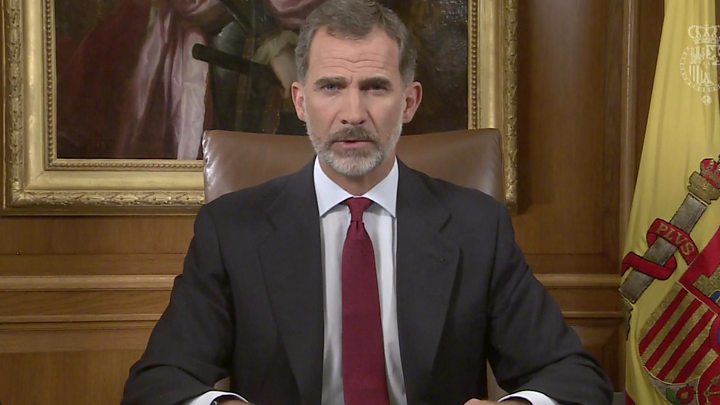
In his televised address, King Felipe said the Catalan leaders who organised the referendum showed their "disrespect to the powers of the state".
"They have broken the democratic principles of the rule of law," he said.
But many Catalans were more concerned about what the king did not say, reports the BBC's Patrick Jackson who watched the address in a bar in Barcelona city centre.
"There were no words about the scenes of police beating voters on Sunday, no urgent appeal for dialogue between the Spanish and Catalan governments, no acknowledgment of the real hunger here for independence or at least a proper, legal referendum, not even a word or two of Catalan," he says.
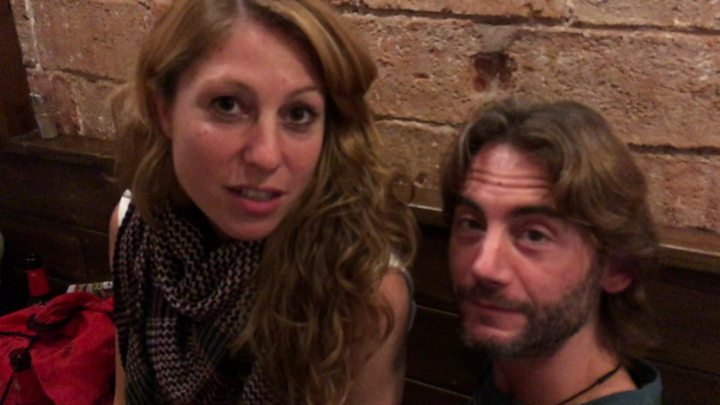
It was a missed opportunity to push the two sides towards dialogue, said one customer in the bar.
News that the head of the local police force, the Mossos d'Esquadra, his deputy and two civic organisers are to be questioned as part of the high court's sedition investigation will likely further aggravate the situation.
On 20 September members of the national security forces were trapped by an angry crowd of pro-independence supporters during a raid on the regional economy ministry, aimed at disrupting Sunday's poll.
The Mossos has been accused of failing to respond properly to their urgent requests for back-up.
Nearly 900 people were hurt as police violently tried to enforce a Spanish court order suspending the vote, which the government had declared illegal.
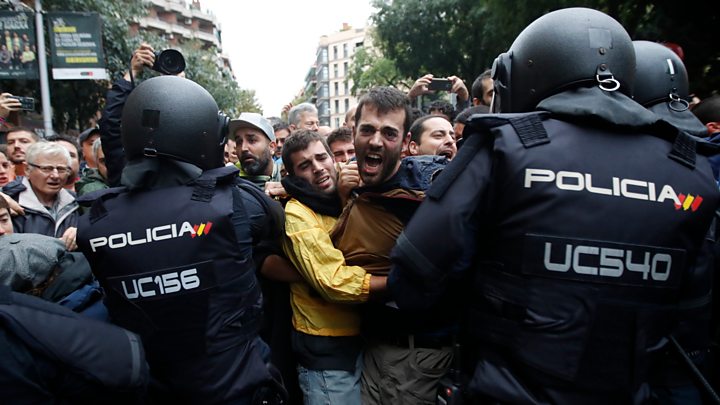
Some police officers were seen firing rubber bullets, storming into polling stations and pulling women by their hair.
Thirty-three police officers were also injured, local medical officials said.
Shocked by what they had seen, hundreds of thousands of Catalans joined street protests on Tuesday. A general strike was also called in protest at "the grave violation of rights and freedoms" seen during the ballot.
More than 2.2 million people voted on Sunday, according to the Catalan government. Officials put the vote in support of independence at nearly 90%, but official results have not yet been released.
There are several reports of gaping irregularities, partly attributed to a system which permitted voters to cast their ballots anywhere in a bid to get around the police measures to stop the vote. Spanish media carried reports of some Catalan areas counting far more votes than residents.
Catalan officials said the turnout was 42%, potentially weakening the position of Mr Puigdemont.
